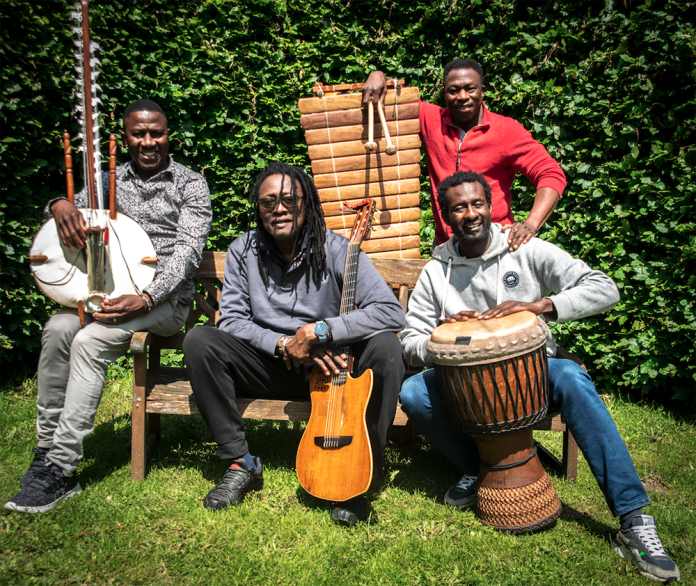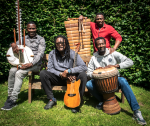

The traveling route from Mali to Côte d’Ivoire to Senegal form an isosceles triangle and would take days if not weeks to travel. The Cedar Cultural Center is making it easy on us to figuratively book the trip by hosting an evening in the middle of the week featuring musicians from all three countries.
On Wednesday, November 13th, Habib Koité, guitarist and composer from Mali makes a return appearance on the Cedar’s stage. He will be joined by balafon player from Côte d’Ivoire, Aly Keita, and Lamine Cissokho, kora master whose roots dig deep into Senegalese soil, drawing on a rich family history of other kora players. An added bonus will be Koité’s longtime percussionist, Mama Kone on djembe, calabash, and electronic pad providing an extra dash of Malian flavor.
The three headliners are collaborating to celebrate Mandé Sila, as described by Rolling Stone, “the way of the Mandingo empire, symbolizing languages, cultures, music, and the organology of West Africa.”
Mshale caught up with Habib Koité recently. He has not performed in the Twin Cities in many years. As was true for nearly everyone, the global pandemic impacted Koité, too. “In my country, in Mali, Covid left its mark everywhere. All planes stopped flying. All the immunization campaigns were difficult to put in place,” he said, his voice resonate and somber. “Especially for those of us who wanted, or needed, to travel, these were difficult times. All the damages caused by it, material, financial, and human. There were a lot of deaths, especially in the Occident.”
Koité persevered, “So for musicians like me, from West Africa, from Mali, I had to stay home, for a very long time.”
For many artists, musicians especially, home-made projects and productions became the norm. Some musicians simply offered gigs for free via YouTube or Facebook. Some sequestered themselves and delved deep into their passions.
“I took advantage of that time to enjoy my home. Make music, too, yes. We had requests for music from the living room. We made music in my living room,” said Koité. “People who had to stay home, who were not allowed to go out. There were shows for them, so they could watch their favorite bands and musicians, from their living rooms. We had offers like that. We made recordings, in my living room, and then we sent them to the TV station [for broadcast], of course.”
He acknowledged, “We still need to tighten the belt, because after all that, the gates of Heaven are far. We are trying to stay patient and hope for better days.”
Now the better days have come.
While the album Koité and his band released directly before the pandemic “was not at all what we would have wanted it to be” as it was, due to the pandemic, “completely far-fetched, completely straining for me,” he’s writing new music now.
“My music, the music I write, is inspired by local music from Mali. For people who make music, there is a curiosity, an inquisitiveness that needs to be satisfied. As a Malian, there is an inquisitiveness to satisfy.”
Koité finds that the music from Mali is so diverse, so varied, “we do not need to go look anywhere else.”
On the horizon…Koité laughed softly at the question. “What I am working on now…easy question to ask, but my thoughts go everywhere, trying to know what to feel or what I should be working on. I think, should I do a solo album, an instrumental album? Ideas go by, I have to decide, make a choice.”
Lamine Cissokho identifies himself as a musician without borders. But with a musical tradition that encompasses his family back to the 14th century, he’s not able to shed his Senegalese roots. He’ll join Koité to create an amalgam of sound and rhythms.
Cissokho has so far composed and arranged about 200 own songs which are inspired by the Mandingo tradition but are revisited by touches of jazz, oriental music and Nordic folk chords.
The third mainstay of this tour, Mandé Sila, is Aly Keita playing as his father did on the balafon. His family is also a griot family from Côte d’Ivoire. While Keita was born in Abidjan, he now lives in Berlin, Germany where he performs solo and with several other groups. He teaches balafon to all ages.
Tickets for the November 13th show, which starts at 7:30 pm are available here.
About Susan Budig
Susan is based in Minneapolis and reports on general assignments for Mshale with a focus on entertainment. In addition to reporting, she is also a writer, poet, teacher and coach.
- Web |
- More Posts(164)






